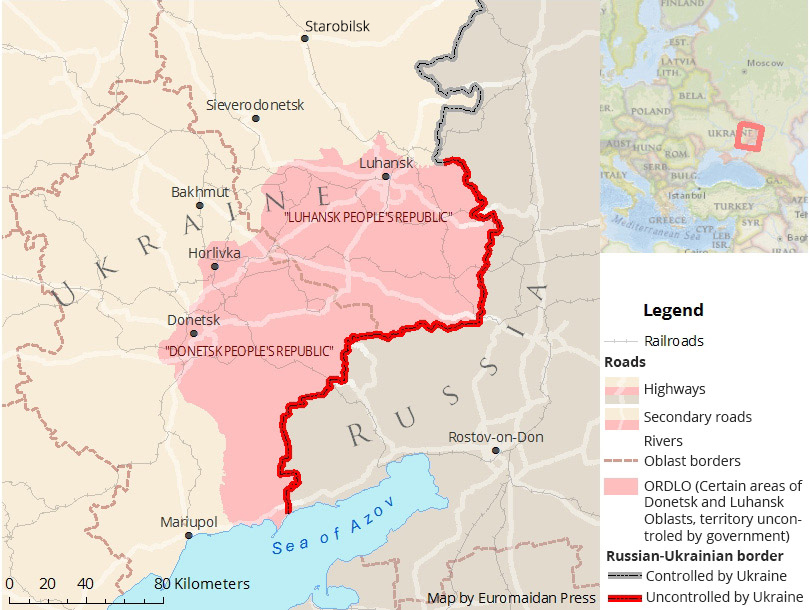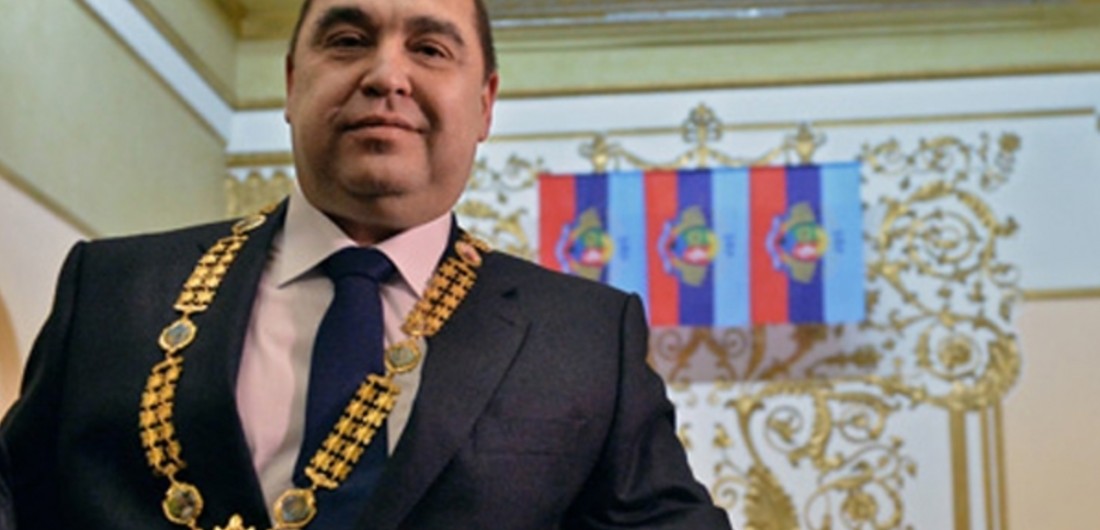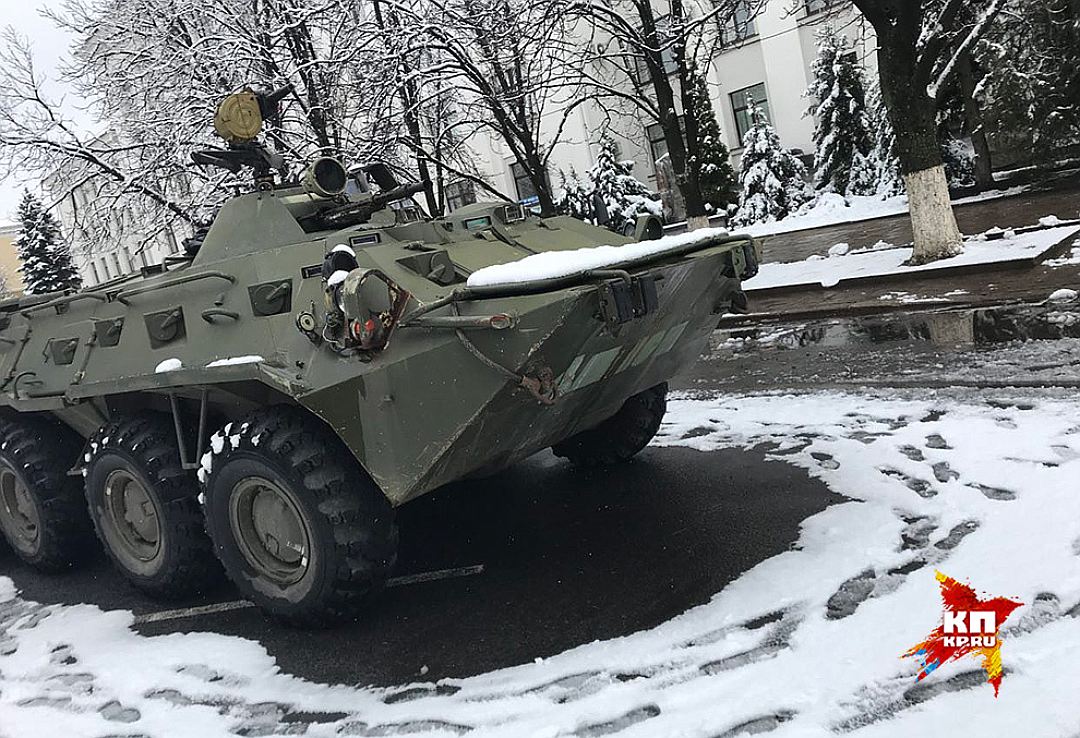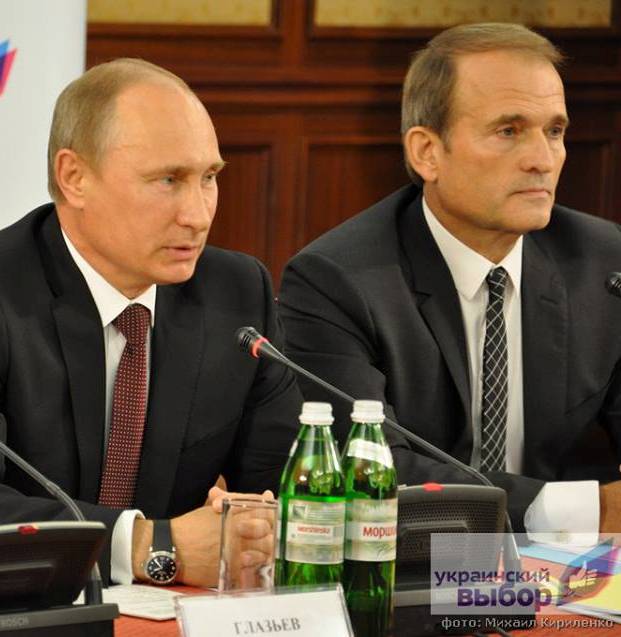Luhansk has been under the control of the Russian-hybrid forces since spring 2014. Moscow-installed local resident Igor Plotnitsky remained the political head of the "LNR" for three years.
On 21 November, a dismissed "minister of interior" of the "LNR" has taken control of the regional capital city of Luhansk. Local sham police forces backed by law enforcement units from the neighboring Donetsk statelet blocked several central streets and cordoned off the TV center and government buildings. Local TV and radio broadcasting went off the air. In the evening of the same day, a massive convoy arrived from Donetsk.
#Luhansk:
#1-2 ex Luhansk reg administration building [=https://t.co/tPonrCJ3qJ];
#3 near the puppet theatre [=https://t.co/lGfX6Prir0];
#4 Theatre Sq ("the White House") [=https://t.co/a2ECgRl2nd] pic.twitter.com/am9H2jOmOZ— English Luhansk (@loogunda) November 22, 2017
Read more on 21-22 November developments in Luhansk: Coup attempt underway in occupied Luhansk: what we know so far
What could look like a blackmail attempt of a dismissed chieftain to keep his seat turned into a real coup on its third day, when several of Plotnitsky's allies were arrested on 23 November, Igor Plotnitsky had reportedly fled to Russia, and his security minister Pasechnik declared himself a new acting head of the LNR.
The troops from the neighboring occupied Donetsk, which were deployed twice amid the coup, returned home, leaving a person from the so-called Donetsk People's Republic's ministry of state security (MGB) as a local security minister.

On 24 November, the so-called LNR minister of state security Pasechnik, who remained in the shadow on the first days of the coup, told in his video address that Plotnitsky had filed a letter of resignation from his post of the head of the "Luhansk People's Republic." Pasechnik called himself a new acting heard of the "LNR."
Over a week since then, both ousted Plotnitsky and the main plotter of the coup against him, "LNR minister of the interior" Igor Kornet, made no statements. Moreover, the actual whereabouts of Plotnitsky remain unknown.
The story of Plotnitsky

In the beginning of the occupation of Luhansk, Igor Plotnitsky, a former clerk of a regional Inspectorate for the Protection of Consumer Rights, organized a pro-Russian military battalion Zarya in late April 2014. Later in May, the self-proclaimed occupation authorities appointed him as the Minister of Defense for the self-styled "Luhansk People's Republic."
In August 2014, Plotnitsky becomes an "LNR head" and later wins the sham election organized by Russia to create an appearance of wide support for separatism, as well as for making the occupation authorities seem legitimate. Of course, no independent international observers monitored the process and an aggressive anti-Ukrainian campaign preceded the election.
A journalist investigation by Ukrainska Pravda pointed to a connection between Plotnitsky and a former Ukrainian official, Oleksandr Yefremov, one of the leaders of the Party of Regions led by ousted President Viktor Yanukovych.
Since 10 November 2014, Igor Plotnitsky has been wanted by the Security Service of Ukraine (SSU) for his role in the "LNR."
In 2015, strongman Plotnitsky strengthened his power and organized assassinations of a few chieftains of separatist groups he couldn't control, as well as he ousted back to Russia his main rival Kozitsyn, who controlled the entire south of the occupied area of the province. Of course, according to occupation authorities, Ukrainian saboteurs were behind all the assassinations except for the first one.

Andriy Dikhtyarenko, editor-in-chief of Luhansk's Realnaya Gazeta newspaper in exile, commented on the Plotnitsky reign in Luhansk to Hromadske:
“[During Plotnitsky’s leadership] there were constant murders, dismissals of so-called ministers, corruption and embezzlement scandals, scandals to do with looting of humanitarian aid, scandals to do with murders and unusual death circumstances of various warlords in Luhansk,” he said.
According to Dikhtyarenko, Pasechnik was directly controlled by Russia’s FSB, with his leadership being FSB generals. His unrealized ambitions from working in Ukraine's security service pushed him to the occupant's side: after the start of the Russian-inspired separatist movements in Donbas, he headed the "LNR state security ministry” under the control of Russia’s FSB, which performed acts such as monitoring the state security of Russia on the border with the "LNR." Dikhtyarenko supposes that Pasechnik's FSB control is what gave him the power to remove Surkov's people from office, resulting in the coup.
This conflict between Plotnitsky and "law enforcement" ministers started back in 2015 as Pasechnik and Kornet arrested the so-called “minister of the coal industry,” Dmitriy Lyamin on corruption charges. But Plotnitsky claimed that Pasechnik and Kornet had no right to detain his minister without his permission. Everyone remained in their job roles then.
On 6 August 2016, an explosion of a bomb planted on a lamp post damaged Plotnitsky's car and injured the "LNR" head. Of course, the occupation authorities claimed "Ukrainian saboteurs" might be behind the attack, but later in September 2016, Plotnitsky stated that a conspiracy against the "LNR" had been uncovered. Former “LNR prime minister” Gennady Tsypkalov (call sign Ryzhyi) and former deputy head of the Luhansk People’s Militia (army) Vitaly Kiselyov (call sign Communist) were detained by "LNR" special services for plotting the coup. Tsypkalov was later found hung in his prison cell.
A year later, on 9 November 2017, Plotnitsky personally dispossessed "LNR minister of interior" Igor Kornet of a mansion, which the “chief policeman” seized in 2014 for himself from a family that fled Luhansk as war had erupted.
The 21-24 November coup was triggered by a ruling of the so-called Luhansk city Leninskyi district court dismissing "LNR minister of interior" Igor Kornet. On 20 November, head of “LNR” Igor Plotnitsky signed a decree on the resignation of the “minister.”
A video was published on 23 November titled "Arrival of Igor Plotnitsky to Moscow," its description was "Sheremetyevo D terminal, flight SU-1157 Rostov-Moscow at 19:10msk. Now he's rushing on a taxi to Voronezh." Plotnitsky dwells in Russia, however, his exact whereabouts remain unknown by now.
A day later, on 24 November 2017, an "official" LNR website stated that Plotnitsky had retired from the presidency citing his poor health.
The website stated that security minister Leonid Pasechnik had been named acting leader "until the next elections." The following day the 38-member People's Council of the self-styled state unanimously approved Plotnitsky's resignation.
Donetsk invaders return home
Units of the "Donetsk People's Republic" ("DNR") were deployed to Luhansk amid the coup. As Plotnitsky fled Luhansk and his allies were detained by the plotters, detachments of the Russian-hybrid forces returned to their Donetsk bases on 25 November. A day later, two video footages emerged of the convoy moving along the M04 "Luhansk-Donetsk" highway towards Donetsk:
#M04 #Luhansk-#Donetsk HW: Military convoy returns to Donetsk. Trucks marked "Chechen" 780, 781 etc (call sign by Andrey Borisov and the name of his gang, no connection to Chechnya). Video via @666_mancer Located by @etkmkao: https://t.co/MoED84L1uY pic.twitter.com/2VnvuMwClg
— English Luhansk (@loogunda) November 26, 2017
#M04 #Luhansk-#Donetsk HW: Military convoy on its way to Donetsk from Luhansk passing by the city sign at #Debaltseve SW exit, location: https://t.co/F0N9Kl34X6 video via @666_mancer pic.twitter.com/viMhJ7MaLN
— English Luhansk (@loogunda) November 26, 2017
The real junta

"LNR minister of the state security" Leonid Pasechnik couldn't be appointed as an acting "LNR head" even according to the sham constitution of the statelet. Under its Article 62, only the "head of the People's Soviet of the Luhansk People's Republic" can become an acting "LNR head." This means that the putsch has resulted in putting a real junta in power of the occupied territory.
Ironically, in 2014, Russian state media an officials labeled the Ukraine's post-Euromaidan interim government and the acting president "the Kyiv junta," claiming ousted president Viktor Yanukovych to be a lawful head of the state. Occasionally, they continues to repeat this Russian propaganda message. And now one of two Russian fake states, established in occupied Ukrainian eastern provinces, has its own real junta.
Meanwhile, all three key figures of the "LNR" coup - Igor Plotnitsky, Igor Kornet, and Leonid Pasechnik - are under the US sanctions. Igor Plotnitsky is on the EU sanctions list.
What's next
Minsk accords and prisoner swap
The representatives of the OSCE, Russia, and Ukraine in the Trilateral contact group (TCG) on settlement of the conflict signed the agreement known as Minsk-2 in February 2015. Later, heads of "LNR" and "DNR," Igor Plotnitsky and Aleksandr Zakharchenko, also added their signatures to the document, although without any official titles. As the "LNR" coup ousted Plotnitsky as one of the signees of the Minsk deal, the Minsk peace process could be undermined as well as the prisoner exchange agreed by the Minsk group just before the putsch could fall apart.
Acting "LNR head" Pasechnik declared his commitment to the Minsk peace process and confirmed previous accords on the prisoner swap. An official "LNR" website announced that Plotnitsky had been named the "LNR" representative to the Minsk process, aimed at resolving the conflict.
The TCG has confirmed the readiness of conflicting parties for an exchange of captives, the OSCE special envoy to the group, Martin Sajdik, said at a briefing on 29 November.
Earlier, the adviser to the SBU Security Service's chief, Yuriy Tandit, announced that the Ukrainian side was ready to exchange 306 militants imprisoned in Ukraine for 74 Ukrainian citizens, including POWs, captured in Donbas.
Surkov vs FSB
Both pseudo-republics have been established and fully controlled by Russia. Kremlin's aide Vladislav Surkov has full control of the politics and the local political power was outsourced for heads of "LNR" and "DNR." The military is controlled and supplied by the Russian 8th army with its staff located in Novocherkassk near the Ukrainian border.
Read also: Russian “siloviki” oversee power vertical of occupied Donbas
Law enforcement is controlled by the Russian Federal Service of Security (FSB). That's why the Luhansk "police" and security agencies acted as one and were backed by Donetsk law enforcers.
The "LNR" coup wasn't just a personal power struggle; it allowed the FSB to take control of the political power in occupied Luhansk, lessening Surkov's grip over the proxy statelet, at least until the next "elections" take place. Now the occupied part of Luhansk Oblast may become even more a police state than it was over the past three years.
Fake peacekeepers or reinforcement for winter operations
There were no confirmations that any serious manpower reinforcement arrived from Russia amid the coup. The "Donetsk invaders" returned to their bases, at least most of those who participated in the "LNR" coup.
Absorption of the LNR by the DNR
As far as "DNR" troops were involved in the coup, it looked like an attempt of the "Donetsk People's Republic" to absorb the "LNR." Later Luhansk local resident Leonid Pasechnik, who worked for the Security Service of Ukraine before the war, declared himself the nominal head of the Luhansk statelet.
A strong case for a merger can be made from a financial point of view: the unification of the two “republics” can decrease Russia's expenditures for supporting its proxy statelets.
However, there are no signs that Donetsk is going to "annex" Luhansk. But following the "LNR" coup, "DNR" strengthened it power in Luhansk as on 28 November Anatoly Andreyev took the vacant post of the "LNR minister of the state security." Last summer, a man with the same full name was a deputy minister of the state security of the "Donetsk People's Republic."
The unification of two unrecognized republics would make them even more illegitimate. That is why when Igor Kornet spoke negatively about Plotnitsky, he always claimed that he has many complaints and accusations about Plotnitsky's people but nothing against Plotnitsky himself because the ousted "LNR head" is one of the signees of the Minsk agreement.
The first visible change
After the LNR coup, nothing changed in everyday life of Luhansk residents so far. No official statements were made regarding any changes in the political course of the statelet. For now, the only publicly visible change is Russian flags that emerged on the buildings of the "Ministry of interior affairs" and on the police stations flying alongside the LNR flags.
In the April, the "parliament" of another Russian-controlled territory, Moldova's Transnistrian region, approved a bill allowing the use of the Russian flag alongside so-called PMR flag. The self-styled "Transnistrian Moldovan Republic" (PMR) hasn't been recognized as a state even by Russia for 26 years. The Transnistrian bill is meant to bolster morale while waiting for Russia to "reunify" with the Moldovan region, it reads:
The state flag of the Russian Federation stirs a strong association with the Russian state among the Transnistrians, the multinational people of Russia, part of which the people of Transnistria feels itself and this national association has a strong historical basis.
The motivation of Luhansk occupation authorities remains unknown.
Read also:
- Coup attempt underway in occupied Luhansk: what we know so far
- Russian “siloviki” oversee power vertical of occupied Donbas
- Russian proxy “republic” sentences two pro-Ukrainian football fans to 13 & 17 years
- Mysterious deaths of chieftains in Russian-backed “republics” since 2015 in a nutshell
- Alleged “military coup” followed by purge of “LNR” chieftains
- Ukrainian civil resistance to Russian occupation in Donbas
- Donetsk separatists call to replace Ukraine with Russian imperial province Malorossiya
- First head of Russian-backed “Luhansk People’s republic” Bolotov reported dead
- Executed in Donbas: activists present data on 95 extrajudicial killings
- What assets did Russia’s puppet republics seize from Ukraine? Full list
- Policy shift shows Russia preparing to recognize its puppet republics in Donbas








